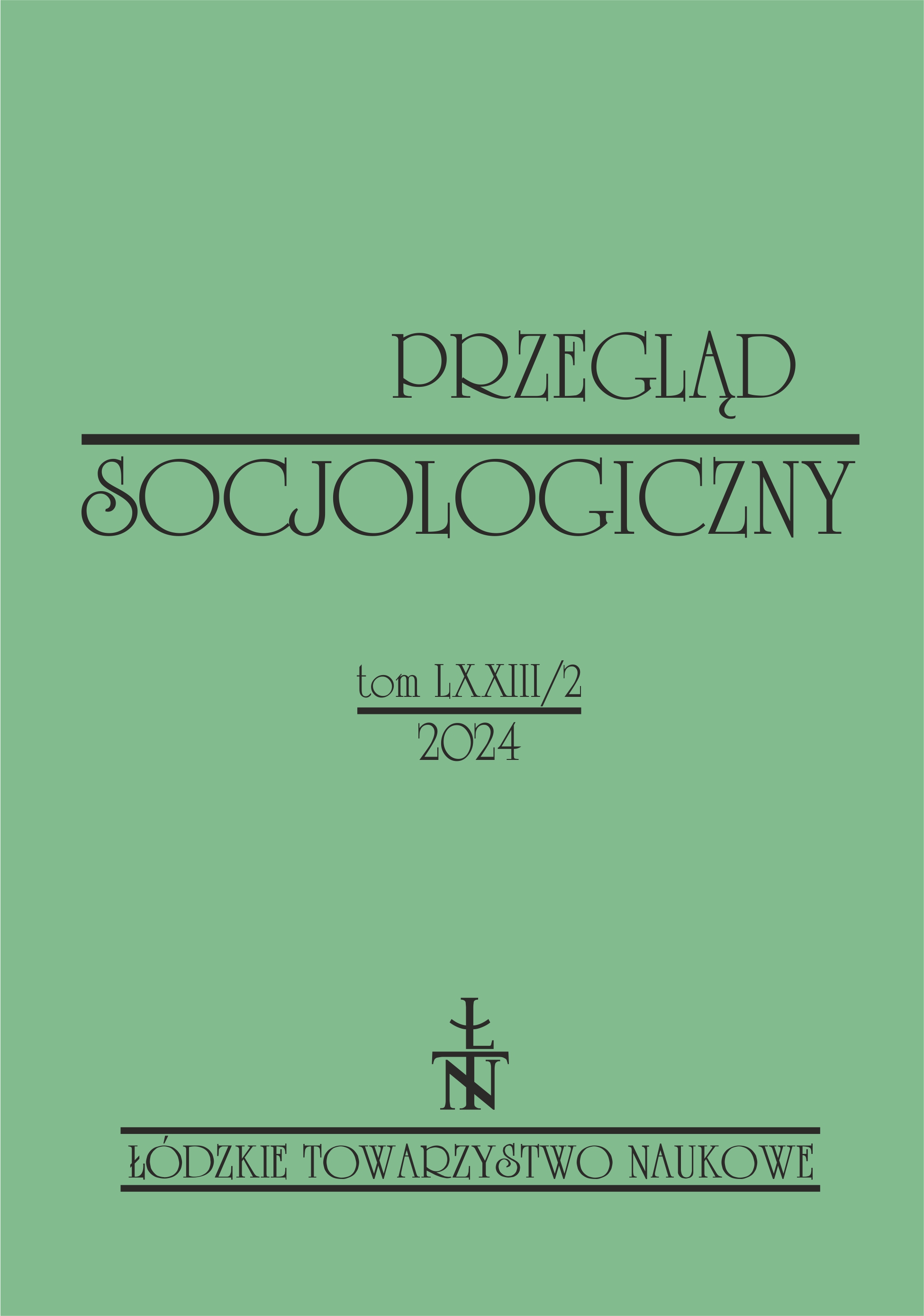The environmental sociology and the sociology of morality. Contact points, synergy or separation?
DOI:
https://doi.org/10.26485/PS/2024/73.2/3Keywords:
environmental sociology, sociology of morality, middle classAbstract
This article presents a comparative analysis of two sociological sub-disciplines: the sociology of morality and the environmental sociology. The author points to the genealogical and methodological differences and similarities, as well as those related to the research subject of both sub-disciplines in order to establish the affinity of the sociology of the environment and the sociology of morality, which can be observed despite the different age and degree of institutionalisation of both sub-disciplines. The author recognises the increase in environmental awareness and the intensification of environmental problems and crises as factors influencing the gradual institutional consolidation of environmental sociology in the scientific field. One of the main conclusions of the article is the indication that the discourse and pro-ecological values are universalistic and normative in nature, and their implementation is subject to moral assessments conditioned by the class habitus and doxa of the middle class, and thus is engaged in the mechanism of (re)production of class distances. This, in turn, is the basis for formulating the hypothesis of environmentalism as a new (bourgeois) morality, and environmental sociology as a new sociology of (bourgeois) morality.
References
Bachram Keidi. 2017(2004). Climate fraud and carbon colonialism: The new trade in greenhouse gases. In: The globalization and environment reader. P. Newell, J.T. Roberts (eds.), 162–176. Oxford: Wiley-Blackwell.
Bargheer Stefan, Nicholas Hoover Wilson. 2018. “On the historical sociology of morality: Introduction”. European Journal of Sociology/Archives Européennes de Sociologie / Europäisches Archiv Für Soziologie 59(1): 1–12. https://doi.org/10.1017/S0003975618000012.
Bauman Zygmunt. 1996. Etyka ponowoczesna. tłum. J. Bauman, J. Tokarska-Bakir. Warszawa: Wydawnictwo Naukowe PWN.
Bauman Zygmunt. 2010. Panika wśród pasożytów, czyli komu bije dzwon. W: Wojny klimatyczne. Za co będziemy zabijać w XXI wieku?. H. Welzer, 5–13. tłum. M. Sutowski. Warszawa: Wydawnictwo Krytyki Politycznej.
Burger Tadeusz. 1992. Świadomość ekologiczna. Między lękiem a działaniem. Warszawa: Instytut na rzecz Ekorozwoju.
Chemhuru Munamato. 2017. “Elements of environmental ethics in ancient Greek philosophy”. Phronimon 18(1): 15–30. https://doi.org/10.17159/2413-3086/2017/1954.
Ciplet David. 2022. “Transition coalitions: Toward a theory of transformative just transitions”. Environmental Sociology 8(1): 1–16. https://doi.org/10.1080/23251042.2022.2031512.
DeFronzo James, Jungyun Gill. 2020. Social problems and social movements. New York – London: Rowman & Littlefield.
Dzwonkowska Dominika. 2016. „Etyka cnót wobec kryzysu ekologicznego”. Przegląd Filozoficzny – Nowa Seria 25(2): 57–67.
Faber Daniel. 2008. Capitalizing environmental injustice: The polluter-industrial complex in the age of globalization. New York: Rowman & Littlefield.
Giddens Anthony. 2010. Klimatyczna katastrofa. tłum. M. Głowacka-Grajper. Warszawa: Prószyński i S-ka.
Gliński Piotr. 1988. „Świadomość ekologiczna społeczeństwa polskiego – dotychczasowe wyniki badań”. Kultura i społeczeństwo 32(3): 183–196.
Gliński Piotr. 1989. „Ruch ekologiczny w Polsce – stan obecny”. Prace Komitetu Obywatelskiego przy Przewodniczącym NSZZ Solidarność 2.
Gliński Piotr. 1996. Polscy Zieloni. Ruch społeczny w okresie przemian. Warszawa: Wydawnictwo IFiS PAN.
Hrynkiewicz Józefina. 1990. Zieloni. Studia nad ruchem ekologicznym w Polsce 1980–1989, Warszawa: Instytut Socjologii UW.
Kiciński Krzysztof. 1984. Socjologia moralności. Warszawa: Wydawnictwa Uniwersytetu Warszawskiego.
Kiciński Krzysztof. 1999. Moralność. W: Encyklopedii socjologii, t. 2. W. Kwaśniewicz (red.). Warszawa: Oficyna Naukowa.
King Leslie, Deborah McCarthy Auriffeille. (eds.). 2020. Environmental sociology: From analysis to action. London: Rowman & Littlefield.
Lukes Steven. 2012. Durkheim. Życie i dzieło. tłum. E. Klekot, E. Szul-Skjoeldkrona. Warszawa: Oficyna Naukowa.
Mariański Janusz. 1986. Socjologia moralności. Wprowadzenie i bibliografia prac polskich 1946–1982. Poznań–Warszawa: Pallottinum.
Mariański Janusz. 1989. Wprowadzenie do socjologii moralności. Lublin: Wydawnictwo KUL.
Mariański Janusz. 2006. Socjologia moralności. Lublin: Wydawnictwo KUL.
Matczak Piotr. 2000. Problemy ekologiczne jako problemy społeczne. Poznań: Wydawnictwo Naukowe UAM.
Musielak Łukasz. 2012. „Między etyką a socjologią jest utopia. Odpowiedzialność jako fundament socjologii Zygmunta Baumana”. Studia Socjologiczne 2(205): 130–142.
Newell Peter, J. Timmons Roberts (eds.). 2017. The globalization and environment reader. Oxford: Wiley–Blackwell.
Nixon Rob. 2011. Slow violence and the environmentalism of the poor. Cambridge MA – London: Harvard University Press.
Ossowska Maria. 1947. Podstawy nauki o moralności. Warszawa: Czytelnik.
Ossowska Maria. 1956. Moralność mieszczańska. Wrocław: Zakład Narodowy im. Ossolińskich.
Ossowska Maria. 1963. Socjologia moralności. Zarys zagadnień. Warszawa: PWN.
Pellow David Naguib. 2018. What is critical environmental justice? Cambridge: Polity Press.
Steffen Will, Paul J. Crutzen, John R. McNeill. 2017(2007). The anthropocene: Are humans now overwhelming the great forces of nature? In: The globalization and environment reader. P. Newell, J.T. Roberts (eds.), 614-621. Oxford: Wiley–Blackwell.
Stone Mark. 2018. “Plato, environmental sustainability, and social justice”. Athens Journal of Humanities & Arts 5(1): 105–118.
Stull Valerie, Michael M. Bell, Mpumelelo Ncwadi. 2020(2016). Environmental apartheid: Ecohealth and rural marginalization in South Africa. In: Environmental sociology: From analysis to action. L. King, D. McCarthy Auriffeille (eds.), 143–158. London: Rowman & Littlefield.
Tusznio Joanna, Piotr Matczak, Marcin Rechciński, Adam Choryński, Krzysztof Niedziałkowski. 2023. “Rising to the challenge? The state of the art and future research directions of Polish environmental sociology”. Polish Sociological Review 221(1): 27–46. https://doi.org/10.26412/psr221.02.
Weber Max. 2011. Etyka protestancka i duch kapitalizmu. tłum. D. Lachowska. Warszawa: Wydawnictwa Uniwersytetu Warszawskiego.
Downloads
Published
How to Cite
Issue
Section
License
Copyright (c) 2024 Łódzkie Towarzystwo Naukowe

This work is licensed under a Creative Commons Attribution 4.0 International License.



